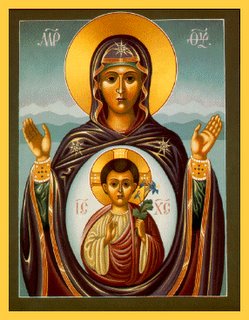Immersing ourselves in Prayer and in God
 Station at Saint Anastasia's
Station at Saint Anastasia'sThis ancient church is situated at the foot of the Palatine hill and was the parish church of this wealthy quarter of Rome since the 4th-century. The titulus Anastatiae was founded in the house of a Christian lady called Anastasia and a synod in 499 mentions this. Like so many of the ancient churches of Rome, they were originally 'house churches', the homes of wealthy Christians at which early Christians gathered. As such, the old Roman lectionary appointed the account of the cleansing of the Temple (cf Mt 21:10-17) for today and it must have had a particular sting for the elite of Rome who lived on the Palatine!
When Rome became a province of the Byzantine empire, the officials of the Eastern empire wanted to honour the memory of the oriental martyr, St Anastasia (who is mentioned in the Roman Canon) and chose this church which also bears her name as the Stational church for today, the second ferial day in Lent (according to the old Roman reckoning) and for the Mass at Dawn on Christmas day.
Continuing from yesterday's reflection by the then-Cardinal Ratzinger, in Journey to Easter, he reflects on the presence of Our Lady hidden in today's readings (Isa 55:10-11; Ps 34; Mt 6:7-15). He writes:
"It is difficult to find elsewhere the mystery of Christ allied to that of Mary in a form as clear and condensed as in the perspective of this promise [in Isaiah]. For when it affirms that the word, or better the seed, bears fruit, it means to say that it does not fall on the ground to rebound like a ball, but that instead it penetrates deeply into the soil to absorb the moisture there and transform it into itself. It takes the earth into itself, truly producing something new, transubstantiating that same earth into fruit. The grain does not remain alone: this is part of the fertility mystery of the earth - Mary, the holy soil of the Church, as the Fathers fittingly call her, belongs to Christ. The mystery of Mary signifies in this connection that the word does not remain alone; rather it assumes the other, the earth, into itself. In the earth of the Mother the word becomes man, and now, mingled with the soil of the whole of mankind, it can return again to God.
The Gospel on the other hand seems to be speaking of something quite different. Here it is a question of our mode of prayer, its correct form, its proper content, the way to comport ourselves, and genuine recollection - not so much, therefore, of what it is for God to do, but of how we ought to act before him. In reality the two readings are interdependent. We might say that in the Gospel we come now to see how it is possible for men to become the fertile field for the word of God. This they can become by preparing those elements by which a life can grow and mature. They attain this end by themselves living from those elements, thus transforming themselves, being impregnated with the word, in the word, immersing their life in prayer and therefore in God."
May Our Blessed Mother grant us a share in her fecundity that we too may bring forth the Word and may St Anastasia pray for us.








0 Comments:
Post a Comment
<< Home